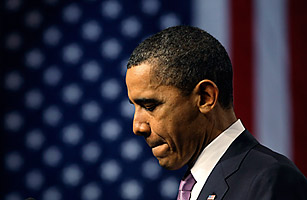
The New Republic recently asked an intriguing question about the U.S. intervention in Libya: Why isn’t Obama getting credit for preventing an atrocity? The answer is obvious when you think about it: because he prevented the atrocity. It’s hard to get credit for avoiding a disaster when it’s impossible to prove the disaster would have happened without you. Social scientists call this the counterfactual problem. There’s no double-blind study to show what would happen in an alternative Libya where the U.S. didn’t intervene. If you want credit for stopping a disaster, you have to wait until the disaster is already under way to act, like President Clinton did in Bosnia.
This is a problem for public policy because preventing disasters is infinitely preferable to stopping them in progress. And it’s a political problem for Obama, who kicked off his re-election campaign on Monday. He is the counterfactual President, not just on his Libya policy, but on almost all his policies. And as his aides often complain, “I prevented a disaster” is a lousy political slogan. Or as Democratic Congressman Barney Frank of Massachusetts has put it, “It would have been even worse without me” ain’t much of a bumper sticker.
“That’s us: avoiding even bigger messes since 2009,” one senior aide told me before the midterms. “It’s a fruitless message.”
The most extreme example, of course, was the $787 billion stimulus package that Obama signed during his first month in office, when the economy was shedding 700,000 jobs a month. The immediate goal was to avoid a depression, and in that sense it was a tremendous success, stopping the hemorrhaging and stabilizing the scariest economic situation since the Great Depression. The Congressional Budget Office and other independent analysts estimate that without it, the unemployment rate would be 2% higher today.
But 8.8% unemployment is still awful. States and cities are still laying off cops and teachers — just not as many as they would have without the stimulus. That the recovery remains soft is indisputable; that it would have been much softer or nonexistent without the stimulus turns out to be extremely disputable, even though it’s an article of faith among most nonpartisan economists. Once again, there’s no alternative economy that Obama can put in a petri dish to prove how horrific things would have gotten without his intervention. His team has tried to remind Americans that he inherited an economy in free fall, that the aftermaths of financial meltdowns are always long and brutal, that depressions are exponentially worse than even the nastiest recessions. But last November, voters seemed more aware of actual pain than of the theoretical pain they were saved from feeling.
Obama’s defense of other major achievements have similar counterfactual problems. His health care overhaul included serious efforts to rein in soaring costs, but they haven’t kicked in yet — and when they do, they’ll just make medical care somewhat less exorbitant. It’s possible that the public will appreciate premiums that soar a bit less than they would have in the no-action case, but it’s not very likely. His financial reforms should reduce the chances of another Wall Street meltdown, but it’s classic disaster prevention: if they fail, it’s a scandal, and if they work, we won’t notice. “Avoiding financial cataclysms since 2008” isn’t much of a message either.